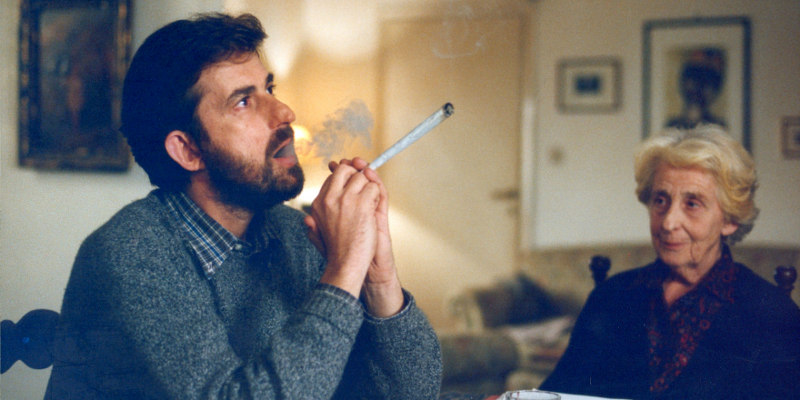
Review by
Eric Hillis
Directed by: Nanni Moretti
Starring: Nanni Moretti, Silvio Orlando, Silvia Nono, Daniele Luchetti

Though he had arrived on the Italian filmmaking scene as a Wellesian
prodigy as far back as the mid-70s, it would take the release of 1993's
Dear Diary to establish writer/director
Nanni Moretti as a fixture of international arthouse programming.
That film saw Moretti play a fictionalised version of himself, an avuncular
Godard ranting about politics and pop culture.
Dear Diary arrived at just the right moment to plug a hole in
the arthouse zeitgeist, fulfilling the needs of two distinct audiences that
had recently emerged - one who wanted more of the Godardian, postmodern
schtick of the previous year's Reservoir Dogs, and those who wished to watch Woody Allen films without having to watch
Woody Allen's films.
If Dear Diary was something of a second debut for Moretti,
1998's Aprile was a difficult second album. There's always the
danger that when a filmmaker has a breakout hit and knows he has garnered a
large audience, that he's going to retreat into either self-indulgence or
political posturing (just look at how Michel Hazanavicius followed up his
Oscar winner The Artist with his disastrous didactic
dirge The Search). With Aprile, Moretti did both.

Moretti has often reductively been labelled "the Italian Woody Allen," and
if you follow this line of thinking, Aprile is his
Stardust Memories. Again, Moretti plays a meta version of himself, but unlike the joyful
character we met in Dear Diary, here we find him tortured by internal and external forces.
Aprile is yet another 8½, a movie about a filmmaker who can't get his act together to make his next
movie. There's also a large dollop of Sullivan's Travels, as Moretti debates whether his talent and platform is better served
educating or entertaining his audience. The entertainment side is
represented by a musical he abandons on the first day of shooting. It's 1994
and Silvio Berlusconi has just won the election, and Moretti believes it's
his duty to take the quasi-fascist down through the medium of film. Over the
next two years, Moretti struggles to document Italian politics, leading up
to the election of 1996, while distracted by impending fatherhood and his
regular trips to the cinema (the movie serves as a time capsule of what was
playing in picture palaces in the mid-90s).

Aprile is as directionless as the dithering version of
himself Moretti essays here. Like Moretti's tortured filmmaker, it can't
decide itself whether it's a piece of entertainment or enlightenment. It's
absolutely possible for a movie to perform both tasks, but in Moretti's film
the two strands merely interrupt one another. Moretti cuts from Mambo scored
frolics to scenes of refugees landing on Italian shores with a moody score
by Ludovico Einaudi in a manner that trivialises the latter while
sucking the joy from the former.
It's easy to see what Moretti's intentions are here. He knows at this point
his movie is going to reach audiences across the globe, so he wants to
highlight the dire political state of his nation. But surely there's a
better way to do this than simply showing us his frustrated reactions to the
arrogance of the right and ineptitude of the left. Perhaps we should be glad
for the invention of podcasts, which have now replaced cinema as the primary
medium for celebrities to spout their political opinions without really
saying anything.

Watching Aprile in 2020 is a very different experience for
international audiences than at the time of its release. While politicians
were as corrupt in the '90s as they are today, they weren't so arrogant
about their corruption. Back in the day, we believed that a man with dubious
business conflicts, Mussolini-esque nationalistic rhetoric and a history of
sexual assault accusations could only become the leader of Italy. How naive
we were.
There's something hypocritical about the conclusions Moretti reaches in
Aprile. Like Joel McCrea in Sullivan's Travels, he ultimately concludes that with so much hardship in real life, the best
way he can serve the Italian cinemagoing public is to give them a couple of
hours of entertainment. The movie ends on a note of classic Moretti, as he
and his crew jive along with the professional dancers on the set of the
musical he's decided to resurrect. If Moretti recognises this as his
strength, why didn't he make a movie more entertaining than
Aprile?

